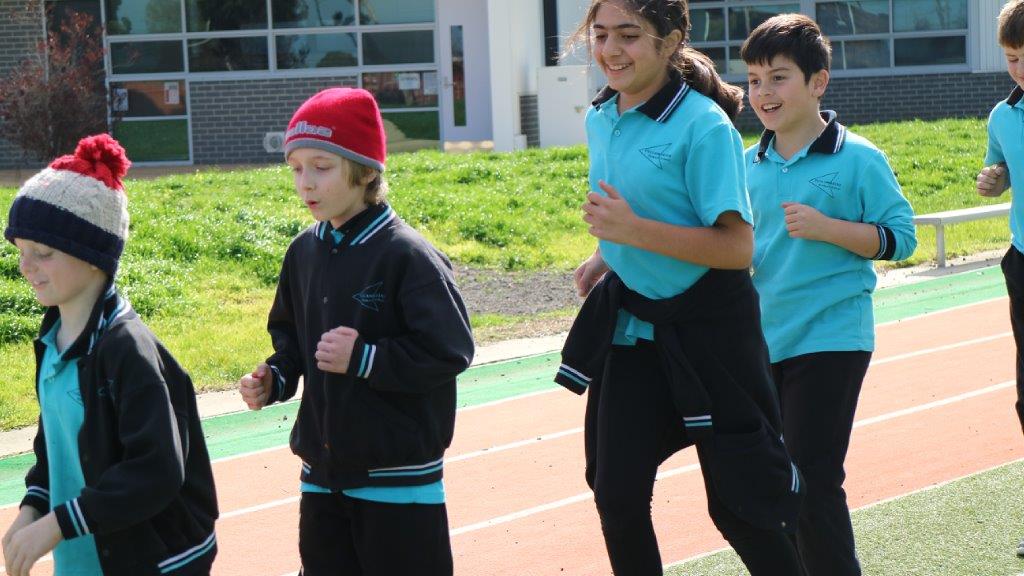-
Our School Pledge
As students of Tullamarine Primary School:
We will demonstrate respect, resilience and teamwork.
We will keep our environment clean and do our best at all times.
We will make ourselves, teachers and parents proud.
Let’s make our school a great and safe place to learn.
-
At Tullamarine PS, we treat each other with RESPECT, demonstrate RESILIENCE and TEAMWORK as we strive for academic excellence in a safe learning environment that is inclusive of all.
-
IN OUR LEARNING SPACES WE ENCOURAGE
-
RESPECT
- Use whole body listening
- Look after resources
- Listen and follow instructions
- Be ready to learn
-
RESILIENCE
- Keep on trying
- Give everything a go
- Learn from mistakes
-
TEAMWORK
- Actively listen
- Contribute
- Work well with others
- Be supportive
- Work towards a common goal
-
IN OUR HALLWAYS AND TRANSITION WE ENCOURAGE
-
RESPECT
- Walk quietly and safely
- Keep hands to yourself
- Be on time
- Stay together
-
RESILIENCE
- Lead by example
- Make good choices
- Hold each other accountable
-
TEAMWORK
- Stay together
- Remind each other of expectations
- Encourage others to move quietly and safely
-
IN OUR PLAYGROUNDS AND OUTSIDE WE ENCOURAGE
-
RESPECT
- Keep our school clean
- Play safely
- Follow school rules
- Be friendly and inclusive
-
RESILIENCE
- Use the Buddy stop
- Be a good sport
- Accept group decisions
- Be a problem solver
- Seek help if needed
-
TEAMWORK
- Be fair and include others
- Be a good sport
- Share equipment
- Play by the rules
-
AROUND OUR TOILETS AND TAPS WE ENCOURAGE
-
RESPECT
- Keep it clean
- Get in and get out
- Flush and wash hands
- Be a friend and wait
-
RESILIENCE
- Go to the toilet in our break time
- Make good choices
- Show patience
-
TEAMWORK
- Arrive and leave with your friend
- Help others
- Keep the area tidy
-
Foundation Unit
-
Starting School – Foundation
At Tullamarine Primary School, the beginning year of school focuses on building the foundations of learning, social-emotional development and independence.
Transition
At Tullamarine Primary School, we understand the transition from kinder to school is both an exciting and daunting time for children and parents alike. Our Foundation Transition program begins in October and includes three transition sessions for children who are enrolled to start at Tullamarine Primary School the following year.
These sessions allow your child to become familiar with the Foundation learning spaces, teachers and their new friends. During the transition sessions, your child will participate in a range of speaking and listening activities, as well as activities based on reading, writing and counting with the support of the teachers. These sessions also provide opportunities for teachers to begin to get to know your child’s learning behaviour, personality and learning requirements. The final transition session also includes a parent information session to share information about our school programs and processes and to share important information regarding preparing your child for school. Supporting children to feel comfortable, confident and excited about their new school is the first step in a positive transition from kinder to school.
Curriculum
English – Speaking and Listening
In Foundation, there is a significant emphasis on Speaking and Listening through a range of engaging oral language activities, including hands on learning experiences such as cooking, and developmental play to promote authentic language experiences where oral sentence structure and vocabulary can be developed. Students also participate in a range of songs, rhymes, shared reading experiences and Turn and Talk.
English – Reading
At Tullamarine Primary School, we endeavour to foster an early love of reading through exposure to a range of engaging genres and text types. Students work in whole class, small group and independent learning experiences to develop and practise reading skills and strategies.
The Foundation Reading program also develops:
• concepts about print (including the parts of a book, direction of print, the concept of letters, words and sentences)
• letter and sound knowledge
• decoding strategies (word reading strategies)
• blending sounds in simple words (cat, run, sat)
• sight word recognition
• comprehension strategiesEnglish – Writing
The Writing program in Foundation aims to engage our students into the writing process to develop young authors who can create texts for different purposes. We support our students to progress through the developmental stages of writing by developing:
• correct pencil grip
• early concepts of writing (print direction, leaving spaces between words)
• letter and sound knowledge and using letters to represent sounds in words
• handwriting – correct upper and lowercase letter formation
• punctuation (uppercase letters and full stops)
• spelling strategiesMathematics – Number
Through a range of hands on and game-based experiences, Foundation students will explore a range of concepts to develop their Number sense. These include:
• creating patterns and sorting
• connecting number names with numerals and pictures (initially to 10 and then beyond)
• counting numbers in sequence
• comparing and ordering quantities
• subitising (recognising the amount in a small collection without the need to count)
• representing addition, subtraction and sharing using practical situationsMeasurement, Geometry and Statistics and Probability topics are also explored throughout the year.
Inquiry
Our Inquiry topics are aimed at fostering thinking skills and questioning and curiosity through the exploration of Science and Humanity topics.
Respectful Relationships Program
Students also participate in the Respectful Relationships Program that promotes the development of interpersonal skills and developing resilience.
-
1 – 2 Unit
-
Learning and expectations
At Tullamarine Primary School, teachers have high expectations in order for students to be able to achieve their best. As teachers, we believe that every student can learn by providing high levels of support and nurturing for all students according to their needs.
Students are provided with a foundation in Literacy where children learn to use and enjoy language as a powerful way of communicating. Students are taught the skills and strategies for reading, writing and speaking and listening. At Tullamarine Primary School we expose the students from a young age to a range of texts types, genres and topics. Students are exposed to these text types through accessing books within our school library, classroom libraries, interactive programs such as Sunshine online and through a range of teaching approaches such as modelled, shared and guided reading. We aim to instil a love of reading because reading connects you with the world. It is one of the most important tools we use every day to connect with each other. Reading also exposes them to a world of imagination, showing them nothing is impossible in this world.
Students are provided with a strong foundation in Numeracy, which will help th to develop a positive and enthusiastic attitude towards maths. Teachers use examples that are relevant to real life situations to help students understand what it means to work mathematically. They utilise a wide range of teaching styles to develop thinking, reasoning, and problem-solving skills.
The Junior School Council (JSC) provides students at Tullamarine Primary School with a valued leadership opportunity. JSC representatives provide a voice for all students regarding matters that affect them. It also provides a forum to plan and implement various recreational and fundraising activities for students during the year.
Curriculum Areas
Learning areas are based on the Victorian Curriculum. This curriculum is the common set of knowledge and skills required by students to become life-long learners and active citizens. Students are engaged in small groups and whole class activities. The focus areas in Grade 1/2 are:
• Reading (5 hours per week)
• Writing/Language Conventions (5 hours per week)
• Numeracy (5 hours per week)
• Inquiry (alternating between History, Science, Geography, Civics & Citizenship each term – 2 hours per week)
• Respectful Relationships (1 hour per week)
• Library (30 minutes per week)
• 4 Specialists each term (STEM, Performing Arts, Visual Arts, LOTE-Italian and PE)Ideas to Help Your Child’s Learning:
• Read with your child every night and discuss the book by asking questions before, during and after reading the book.
• Engage in purposeful reading and writing (such as writing lists, recipes, cards or emails).
• Participate in Maths in everyday life (such as shopping, cooking, counting).
• Discuss everyday mathematics that involves length, days of the week, months of the year, calendars and shapes.
• Encourage your child to become more independent and take responsibility for their belongings and notices.
-
3 – 4 Unit
-
Expectations
Our Values
We show RESPECT by using positive actions and words at all times.
We show LEADERSHIP by taking responsibility for our learning and actions.
We show CREATIVITY by using initiative when solving problems and when faced by challenges.Grade 3/4 students are expected to come to school each day, ready to learn, with the necessary mindset and resources. They must be prepared to be challenged in their learning and follow the school values, rules and policies at all times.
Students recite the school pledge at assembly each week. It is expected that all students implement what is recited in this pledge and that they embrace and demonstrate the school values highlighted in the pledge. They are also expected to be aware of and follow the processes outlined in the School Wide Positive Behaviour plan and the behaviour matrices displayed around the school, in classrooms, in the yard and in the toilet area.
ALL Grade 3/4 students receive a diary in the bookpack at the commencement of the school year. It is expected that the students have this diary with them each day and use the diary to record important events, due dates of notes/work and their home reading. This diary is expected to travel home at the end of each day and return to school with the student the following day.
Grade 3/4 students have ready access to digital technologies within their classroom. At the commencement of the year, they fill out and agree to a School Policy around the appropriate usage of these devices, which they must adhere to at all times.
With regards to homework expectations, the school has developed the following policy for Grade 3/4 students:
Homework Policy
Rationale:
Homework helps students by complementing and reinforcing classroom learning, fostering good lifelong learning and study habits, and providing an opportunity for students to be responsible for their own learning.
Aims:
• To cultivate positive study habits and enhance development of the student’s self-discipline and time-management skills
• To encourage responsibility for student’s own learning
• To provide opportunities for reinforcement and extension of the classroom program
• To provide opportunities for parents to share in their child’s learning
• For homework to be purposeful and appropriateImplementation:
Homework expectations will be outlined at the beginning of the school year through the Learning Community brochure. A copy of the school’s homework policy can be found on the school’s website.
Homework in Years 3 to 4 will;
• Mainly consist of daily reading to, with and by parent or siblings. Children will be expected to record a brief summary of what they have read in their diary.
• Include, if necessary, students finishing work that is not completed during class time
• Include learning times tables and other number facts
• Not exceed 30 minutes a day
• Enable the extension of class work by practicing skills or gathering extra information or materials
• Not be set on weekends or during holiday periodsTeachers will not provide homework for children taking extended family holidays. Children will be encouraged to do daily reading and keep a journal of their holiday.
Expectations:
• Teachers will assess homework and provide timely and practical feedback and support;
• Failure by students to complete homework on a regular basis will be followed up with parents
• Students will use homework diaries. Diaries provide a means of regular communication between parents and the school.Curriculum:
All students undertake the following subjects in Grade 3/4 during the year:
• Reading (5hrs/wk)
• Writing/Language Conventions (5hrs/wk)
• Numeracy (5hrs/wk)
• Inquiry (alternating between History, Science, Geography, Civics & Citizenship, each term – 2hrs/wk)
• Respectful Relationships (1 hr/wk)
• SAKGP (1 hr/week)
• Library (30 mins/week)
• Specialists (4 of STEM, Performing Arts, Visual Arts, LOTE-Italian and PE each term)
In addition, students are offered the opportunity to participate in:
• Grade 3/4 swimming program (8 days over 2 weeks)
• Grade 3/4 Camp (3 days)
All students are also involved in the End of Year Celebration Concert in both a class item and a LOTE – Italian item.Selected students may also take part in events such as:
• Tournament of Minds
• Interschool Athletics
• Interschool Cross-Country
• ICAS-UNSW testing in areas including Digital Technologies, Numeracy, Reading, Writing, Spelling and Science.
-
5 – 6 Unit
-
Teaching/Learning
The teaching and learning in the Grade 5/6 area at Tullamarine Primary School is based on the Victorian Curriculum. The Staff use this to develop essential learnings for what should be taught and what is important for students to have opportunities to know, understand and be able to do. The teachers in the 5/6 area use the Tullamarine Instructional Model which helps scaffold learning and support students to become independent and confident learners.
Leadership
Students in the 5/6 area have the opportunity to undertake roles of responsibility. These roles include:
• School Captains & Vice-Captains, JSC President & Vice-President, JSC Representatives, Red House Captains & Vice-Captains, Blue House Captains & Vice-Captains, Green House Captains & Vice-Captains, Yellow House Captains & Vice-Captains, Sustainability Leaders and Sport Leaders.
Students have the opportunity to attend the Young Leaders Conference in Term 1 to learn about leadership qualities and how they can apply these in the above roles of responsibility.Inter-school Sport
The students in the 5/6 area are encouraged to represent the school in competitive Inter-school Sports such as: Cross-Country Running, Basketball, Volleyball, Teeball, T20 Cricket, European Handball, Netball, Soccer, Touch Rugby and Athletics throughout the year.
Rosehill Secondary College
Students in the 5/6 area attend an excursion to experience what it is like to spend a day in a secondary school. This day provides students with the opportunity to be part of Year 7 classes in various curriculum areas.
Gladstone Park Secondary College Musical
Students in the 5/6 area have the opportunity to attend and view a musical performed by students from Gladstone Park Secondary School students at their Performing Arts Centre.
Camp
Students in the 5/6 area have the opportunity to attend a three camp. The camping program aims to develop students’ problem solving skills and their ability to work as part of a team. There is an emphasis on using a range of interpersonal skills and developing the social skills of each student on the camp. It is hoped that the students will find the experiences of the activities both instructive and enjoyable. After having attended camp it is anticipated that students will bring a positive, self-confident and caring attitude towards their peers back into their daily school environment.
-
Thinking of enrolling your child into
Tullamarine Primary School?







